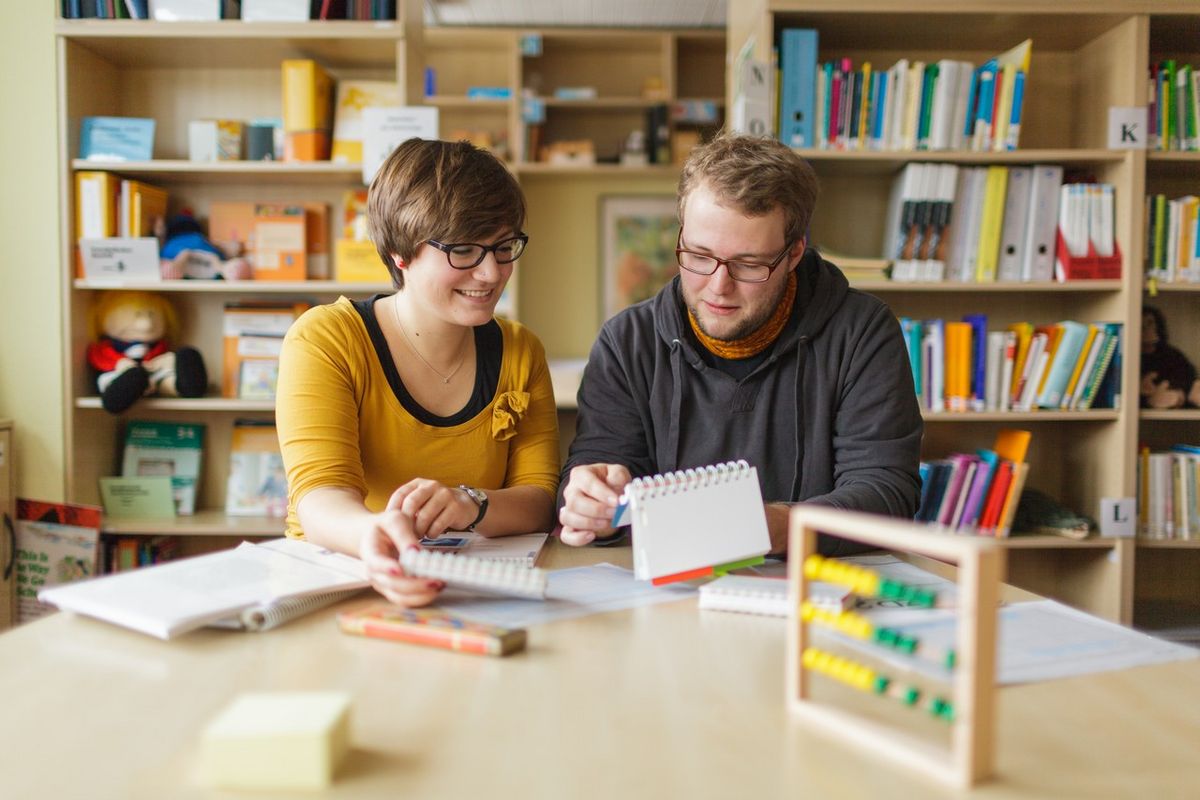Research topics and projects
Overview
The research of the junior professorship is dedicated to several research projects and uses various research methods. Get an overview of all our research topics as well as further reading here.
Personalised learning with educational technology
In current research projects, Dr. Moeller and colleagues develop software and didactic concepts for personalized learning with the help of computers, smartphones, and other devices. First information can be found in the description of the research conducted as part of the Jacobs Foundation Early Career Research Fellowship.
The topic of technology-supported personalised learning has also been addressed in a recent article:
- Dumont, H., Brod, G., Hofer, S. & Moeller, J. (2019)
Individualized learning through adaptive teaching – frontiers in research and practice: White paper
Zürich: Jacobs Foundation - Moeller, J. (2021, October 31). A simple, affordable, scaled-up way of creating materials for personalized learning with educational technology: Crowdsourcing Open Educational Resources. Pre-print
- Moeller, J. (2021, August 8). Averting the next credibility crisis in Psychological Science: Within-person methods for personalized diagnostic and intervention. Pre-print PsychArViv. Pre-print.
Situational motivation of teacher students
The study-related motivation of students studying to become future teachers is the topic of an intensive longitudinal study conducted by Dr. Moeller in collaboration with researchers at Jena University (Dr. Julia Dietrich and Professor Bärbel Kracke), as well as the University of Eastern Finland (Professor Jaana Viljaranta). This project has so far produced the following publications:
- Moeller, J., Viljaranta, J., & Kracke, B., & Dietrich, J., (2020)
Disentangling objective characteristics of learning situations from subjective perceptions thereof, using an experience sampling method design
Frontline Learning Research, 8(3)
Read more - Dietrich, J., Moeller, J., Guo, J., Viljaranta, J., & Kracke, B. (2019)
In-the-Moment Profiles of Expectancies, Task Values, and Costs
Frontiers in Psychology, 10:1662
Read more - Dietrich, J., Viljaranta, J., Moeller, J., & Kracke, B. (2017)
Situational expectancies and task values: Associations with students' effort
Learning and Instruction, 47, 53–64
Read more - Moeller, J., Viljaranta, J., Tolvanen, A., Kracke, B., & Dietrich, J. (2020)
Introducing a dynamic expectancy-value model to examine moment-to-moment developmental of learning motivation
Manuscript submitted for publication - Read more
For further publications by Dr. Moeller about situation-specific motivation of university students, please see:
- Ketonen, E., Dietrich, J., Moeller, J., Salmela-Aro, K., & Lonka, K. (2018)
The role of daily autonomous and controlled educational goals in students’ academic emotion states: An experience sampling method approach
Learning and Instruction, 53, 10–20
Read more
Emotions at School
Dr. Moeller has been studying students' emotions at school in various research projects, including current projects with colleagues at Leipzig University. She has co-authored the following publicatons on emotions and motivation at school:
- Moeller, J., Brackett, M., Ivcevic, Z., & White, A. (2020)
High school students’ emotions: Discoveries from a large national survey and an experience sampling study
Learning and Instruction, 66. [PRE-PRINT]
Read more - White, A., Ivcevic, Z., Moeller, J., & Brackett, M. A. (2018)
Gender identity and sexual orientation labels used by U.S. high school students: A co-occurrence network analysis
Psychology of Sexual Orientation and Gender Diversity, 5(2), 243–252.
Read more - White, A., Ivcevic, Z., Moeller, J., Brackett, M. A., & Stern, R. (2018)
LGBTQ Adolescents’ positive and negative experiences in high school
Sex Roles, 79(9-10), 594–608.
Read more - Moeller, J., Dietrich, J., Eccles, J. S., & Schneider, B. (2017)
Passionate experiences in adolescence: Situational variability and long-term stability
Journal of Research on Adolescence, 27(2), 344–361.
Read more - Salmela-Aro, K., Moeller, J., Schneider, B.; Spicer, J., & Lavonen, J. (2016)
Integrating the light and dark sides of student engagement with person-oriented and situation-specific approaches
Learning and Instruction, 43, 61–70.
Read more - Schneider, B., Krajcik, J., Lavonen, J., Salmela-Aro, J., Broda, M., Spicer, J., Bruner, J., Moeller, J., Inkinen, J., Juuti, K. & Viljaranta, J. (2016)
Investigating optimal learning moments in U.S. and Finnish science classes
Journal for Research in Science Teaching, 53(3), 400–421.
Read more - Moeller, J., Salmela-Aro, K., Lavonen, J., & Schneider, B. (2015)
Does anxiety in math and science classrooms impair math and science motivation? Gender differences beyond the mean level
International Journal of Gender, Science, and Technology, 7(2), 229–254.
Psychological wellbeing in college
In various studies and research collaborations, Dr. Moeller and colleagues examine the wellbeing of university students and ways to improve it. These topics are addressed in the following publications:
- Seppälä, E., Bradley, C., Moeller, J., Nandamudi, D., & Brackett, M. A. (2020)
Promoting mental health and well-being among university students: A randomized control trial of three well-being interventions
Frontiers in Psychiatry
Read more
Engagement and Burnout in work contexts
- Moeller, J., Ivcevic, Z., White, A. E., Menges, J. I., & Brackett, M. A. (2018)
Highly engaged but burned out: Intra-individual profiles in the US workforce
Career Development International, 23(1), 86–105 [PRE-PRINT]
Read more
This article received a Literati Award 2019 as „recommended paper“. Please see also the articles about this study by Emma Seppälä and Julia Moeller in the digital Harvard Business Review, as well as reports about the study in the New York Times (06.05.2018) and other media.
Passion for work
- Moeller, J. (2021, January 7). Specific, situated, intra-individual, dialectical, and open: New avenues to integrate and advance the research on passion for work. Pre-print
- Moeller, J., Ivcevic, White, A., Taylor, C., Z., Menges, J. I., Caruso, D., & Brackett, M. A. (under review). Passion for work: What is it, who has it, and does it matter? Manuscript submitted for publication. Pre-print
Entrepreneurial Passion
- Newman, A., Obschonka, M., & Moeller, J., Chandan, G. G. (2019)
Entrepreneurial Passion: A Review, Synthesis and Agenda for Future Research
Applied Psychology
Read more - Obschonka, M., Moeller, J., & Goethner, M. (2019)
Entrepreneurial passion in organizations: The role of personality
Frontiers in Psychology, 9:2697.
Read more
Emotions and emotional competence („emotional intelligence“) in work contexts
- Ivcevic, Z., Moeller, M., Menges, J. I., Brackett, M., (2020)
Supervisor emotionally intelligent behavior and employee creativity
Journal of Creative Behavior
Read more - Taylor, C., Ivcevic, Z., Brackett, M., Moeller, M. (2020)
Gender and Support for Creativity at Work. Creativity and Innovation Management
Development from states to traits (and vice versa)
One of our research interests is the relationship between psychological fluctuating states and more stable dispositional traits. We examine, for instance,
- whether and how stable dispositions (traits) develop out of the experience of fluctuating states, and
- how situation-spezific measures of emotions and motivation (e.g., "How do you feel right now?“) relate to the more common retrospective assessments (e.g., "How do you typically feel?“), and what we learn about the validity of both kinds of measures.
By studying these research questions, we build bridges between the Developmental Psychoogy, which studies changes over time, and the Personality Psychology, which addresses rather stable dispositions. Dr. Moeller and colleagues integrate both approaches in models of (personality) development.
Dr. Moeller combines this theoretical framework with intra-individual methods, in ordre to explain how specific individuals develop stable motivational dispositions and feelings in regard to learning, school subjects, or work tasks.
This research pursues the goal to inform teachers about the potential long-term consequences of their situational choices of teaching strategies.
The following publications address aspects of the aforementioned research questions:
- Moeller, J., Viljaranta, J., Tolvanen, A., Kracke, B., & Dietrich, J. (2021)
Introducing a dynamic expectancy-value model to examine moment-to-moment developmental of learning motivation
PsyArXiVe, https://doi.org/10.31234/osf.io/6brsa. Pre-print. - Moeller, J. (2021, January 7). Specific, situated, intra-individual, dialectical, and open: New avenues to integrate and advance the research on passion for work. PsyArXiVe, https://doi.org/10.31234/osf.io/rqsgc Pre-print
- Moeller, J., Viljaranta, J., & Kracke, B., & Dietrich, J. (2020)
Disentangling objective characteristics of learning situations from subjective perceptions thereof, using an experience sampling method design. Frontline Learning Research, 8(3). Read more - Moeller, J., Brackett, M., Ivcevic, Z., & White, A. (2020)
High school students’ emotions: Discoveries from a large national survey and an experience sampling study
Learning and Instruction, 66.
Read more [PRE-PRINT] - Moeller, J., Dietrich, J., Eccles, J. S., & Schneider, B. (2017)
Passionate experiences in adolescence: Situational variability and long-term stability
Journal of Research on Adolescence, 27(2), 344–361.
Read more - Dietrich, J., Viljaranta, J., Moeller, J., & Kracke, B. (2017)
Situational expectancies and task values: Associations with students' effort
Learning and Instruction, 47, 53–64.
Read more
Situation-specific assessments and intensive longitudinal studies:
Dr. Moeller specializes in the use and further advancement of situation-specific assessments (e.g., the Experience Sampling Method) and intra-individual analytical methods. For example, she initiated the ManyMoments Project, which aims to improve the replicability, generalizability, reproducibility, and robustness of the findings in intensive longitudinal studies.
Moreover, Julia Moeller has developed new items and scales for the assessments of momentary motivation with te help of the Experience Sampling Method (e.g., Moeller, Dietrich, Eccles, & Schneider, 2017; Dietrich, Viljaranta, Moeller, & Kracke, 2017). She also proposed novel study designs for intensive longitudinal studies of student motivation (e.g., Moeller et al., 2020). Furthermore, Dr. Moeller has addressed pitfalls in the analysis of intensive longitudinal data (e.g., Moeller, 2015).
Publikations using intensive longitudinal data and situation-specific measures:
- Moeller, J., von Keyserlingk, L., Spengler, M., Gaspard, H., Lee, H., Yamaguchi-Pedroza, K., … Arum, R. (2021, April 7).
Risk and protective factors of college students’ psychological well-being during the COVID-19 pandemic: emotional stability, mental health, and household resources.
Pre-print - Moeller, J. (2021, January 7).
Specific, situated, intra-individual, dialectical, and open: New avenues to integrate and advance the research on passion for work.
Pre-print - Dietrich, J., Schmiedek, F., & Moeller, J. (under review)
Learning happens in learning situations, so let's study them. Introduction to the special issue
Manuscript submitted for publication. - Moeller, J., Viljaranta, J., Tolvanen, A., Kracke, B., & Dietrich, J. (under review)
Introducing a dynamic expectancy-value model to examine moment-to-moment developmental of learning motivation
Manuscript submitted for publication.
Pre-print - Umarji, O., McPartlan, P., Moeller, J., Li, Q., Schaffner, J., & Eccles, J. S. (2021). The motivational system of task values and anticipated emotions in daily academic behavior. Motivation and Emotion. MEHR ERFAHREN
- Moeller, J., Brackett, M., Ivcevic, Z., & White, A. (2020)
High school students’ emotions: Discoveries from a large national survey and an experience sampling study.
Learning and Instruction, 66. [PRE-PRINT]
MEHR ERFAHREN - Moeller, J., Viljaranta, J., & Kracke, B., & Dietrich, J. (2020)
Disentangling objective characteristics of learning situations from subjective perceptions thereof, using an experience sampling method design
Frontline Learning Research, 8(3). [PRE-PRINT; OA; OPEN DATA; OPEN CODE]
MEHR ERFAHREN - Dietrich, J., Moeller, J., Guo, J., Viljaranta, J., & Kracke, B. (2019)
In-the-Moment Profiles of Expectancies, Task Values, and Costs
Frontiers in Psychology, 10:1662. [OA; OPEN DATA; OPEN CODE]
MEHR ERFAHREN - Moeller, J., Ivcevic, Z., Brackett, M. A., & White, A. E. (2018)
Mixed emotions: Network analyses of intra-individual co-occurrences within and across situations
Emotion,18(8), 1106–1121. [PRE-PRINT]
MEHR ERFAHREN - Ketonen, E., Dietrich, J., Moeller, J., Salmela-Aro, K., & Lonka, K. (2018)
The role of daily autonomous and controlled educational goals in students’ academic emotion states: An experience sampling method approach
Learning and Instruction, 53, 10–20.
MEHR ERFAHREN - Dietrich, J., Viljaranta, J., Moeller, J., & Kracke, B. (2017)
Situational expectancies and task values: Associations with students' effort
Learning and Instruction, 47, 53–64. [PRE-PRINT bei ResearchGate]
MEHR ERFAHREN - Moeller, J., Dietrich, J., Eccles, J. S., & Schneider, B. (2017)
Passionate experiences in adolescence: Situational variability and long-term stability
Journal of Research on Adolescence, 27(2), 344–361.
MEHR ERFAHREN - Salmela-Aro, K., Moeller, J., Schneider, B.; Spicer, J., & Lavonen, J. (2016)
Integrating the light and dark sides of student engagement with person-oriented and situation-specific approaches
Learning and Instruction, 43, 61–70.
MEHR ERFAHREN - Schneider, B., Krajcik, J., Lavonen, J., Salmela-Aro, J., Broda, M., Spicer, J., Bruner, J., Moeller, J., Inkinen, J., Juuti, K. & Viljaranta, J. (2016)
Investigating optimal learning moments in U. S. and Finnish science classes
Journal for Research in Science Teaching, 53(3), 400–421.
MEHR ERFAHREN - Moeller, J. (2015)
A word on standardization in longitudinal studies: don’t
Frontiers in Psychology, 6(1389). [OA]
MEHR ERFAHREN - Moeller, J., Salmela-Aro, K., Lavonen, J., & Schneider, B. (2015)
Does anxiety in math and science classrooms impair math and science motivation? Gender differences beyond the mean level
International Journal of Gender, Science, and Technology, 7(2), 229–254. [OA]
Intra-individual, person-orientierted methods
Dr. Moeller is interested in intra-individual, so-called person-oriented methods, and the conditions in which these methods reveal patterns that the typical inter-individual methods overlook. She therefore supports the Journal for Person-Oriented Research as an associated editor.
Julia Moeller has developed a novel form of network analysis, which reveals how often two experiences (e.g., two emotions) occur together, or are endorsed together (Moeller, Ivcevic, Brackett, & White, 2018). This method reveals co-endorsements that are easily overlooked with the more common covariance-based methods.
Publikations using or discussing within-person analytic methods:
- Moeller, J. (2021, August 8). Averting the next credibility crisis in Psychological Science: Within-person methods for personalized diagnostic and intervention. Pre-print PsychArViv. Pre-print.
- Moeller, J., von Keyserlingk, L., Spengler, M., Gaspard, H., Lee, H. R., Yamaguchi-Pedroza, K., Yu, R., Fischer, C., & Arum, R. (accepted). College students' emotions during the COVID-19 pandemic: The role of emotional stability, mental health, and household resources. AERA OPEN. Pre-print at PsyArXiv: https://psyarxiv.com/kf8cs [OA]
- Moeller, J., Keiner, M., & Grassinger, R. (2015)
Two sides of the same coin: Do the dual ’types’ of passion describe distinct subgroups of individuals?
Journal for Person-Oriented Research, 1(3), 131–150. [OA]
MEHR ERFAHREN - Moeller, J., Ivcevic, Z., Brackett, M. A., & White, A. E. (2018)
Mixed emotions: Network analyses of intra-individual co-occurrences within and across situations
Emotion,18(8), 1106–1121. [PRE-PRINT]
MEHR ERFAHREN - Moeller, J., Ivcevic, Z., White, A. E., Menges, J. I., & Brackett, M. A. (2018)
Highly engaged but burned out: Intra-individual profiles in the US workforce
Career Development International, 23(1), 86–105. [PRE-PRINT]
MEHR ERFAHREN - Dietrich, J., Moeller, J., Guo, J., Viljaranta, J., & Kracke, B. (2019)
In-the-Moment Profiles of Expectancies, Task Values, and Costs
Frontiers in Psychology, 10:1662. [OA; OPEN DATA; OPEN CODE]
MEHR ERFAHREN - Salmela-Aro, K., Moeller, J., Schneider, B.; Spicer, J., & Lavonen, J. (2016)
Integrating the light and dark sides of student engagement with person-oriented and situation-specific approaches
Learning and Instruction, 43, 61–70.
MEHR ERFAHREN - Cotter, K. N., Ivcevic, Z. & Moeller, J. (2020)
Latent Profile Analysis of Originality and Fluency of Divergent Thinking Responses
Journal of Research in Personality, 86.
MEHR ERFAHREN



